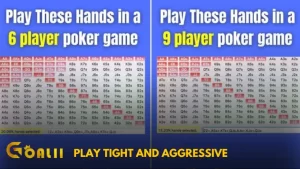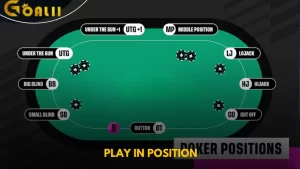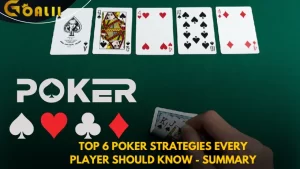Poker Strategies – Poker is more than just a game of luck that many people would put it to be. It is a game of chess, where one has to consider the combinations carefully, be calm, and be able to predict the actions of the opponents. Wherever you are on the poker player learning curve, these 6 strategies provide specific ideas about improving poker skills, boosting your game, and winning.
They are essential regardless of whether it is Hold’em, Omaha, or any other variant of poker that is played. Now, let’s get to the list of the 6 best poker tips every poker player should know with GOGOJILI.

1. Play Tight and Aggressive
A tight, aggressive style is a good starting point when trying to establish yourself at the poker table. The table has a low number of starting hands, meaning to play narrow and fold any mediocre hands. Thus, the Poker Strategies is to wait for those hands that are likely to be a winner. This is because when the range of your hands is smaller later in the game, you are able to make better choices.
On the same note, playing aggressively entails the means of betting and raising and not calling and checking. This approach creates tension in your opponents, and they end up making mistakes. Aggressive betting puts you in the driving seat in that you’ll be in a position to control the flow of actions as well as the magnitude of the pot.
For instance, if you have pocket pair aces or kings, you should go all in preflop to get as many callers as possible to raise out of the game with strong hands. In this case, by keeping the risk high and the rewards low, you cut losses on the weaker hands and increase the chances of earning more on the stronger ones.

Key Takeaway: Concentrate on playing your absolute best hands only, and when you do, take what is known as your ‘line of bet.’ This approach creates stress for your opponents and puts them on the spot into uncomfortable positions.
2. Play in Position
Table position or position in Poker Strategies is a concept that points to the position of a player relative to the dealer. The later your position, the more you stand a better chance since you are the one to play last in any round of betting. This makes it easier for you to know more about your opponent’s Poker Strategies and thus be in a better position to make better decisions.

Playing in position enables you to:
Gather more information: It enables you to observe the action taken by your competitors before you take your own action. This assists you in knowing when to bet, raise, or fold depending on how your counterparts play.
3. Master the Art of Bluffing
Bluffing is probably the most interesting and fun part of the Poker Strategies, or at least it is considered to be one of the most interesting. It refers to the act of making your rivals believe that you are holding a better hand than you really are. However, bluffing is also a powerful tool, which however should be used only occasionally and only in those cases where it is most effective.
Hence, the effectiveness of bluffing is perfectly timed if the opponents are weak or face various issues in their decision-making. For instance, if all players have acted and you alone checked the flop, constant bluffs can enable you to take over the pot and pass the feeling to the other players.
There are two main types of bluffs:
- Pure bluff: When and only when you are out of the draw and have no mathematical prospects for a winning hand, you are going to depend only on a high bluff.
- Semi-bluff: Coupled with this, because you’re clearly a flush or a straight draw, it could get better when you have a drawing hand. If your bluff does not work in this case, then you still have outs to capture the hand.
It is, therefore, very important that when you bluff, it should look like you are telling the truth. In sports betting, you have to have a good story to relay the kind of betting you are doing.
If you’ve been playing in a passive manner and decide to make big bets, all of a sudden, your bluffing will be so glaring. However, do not make this a routine, as this creates a pattern, and your opponent will easily spot it when you are bluffing.
- Key Takeaway: Bluffing is always good but done in moderation. A bluff works perfectly well when it is done with a lot of precision at the right time, but a bluff is disastrous at the wrong time.
- Control the pot size: There are usually chances of raising the pot if you have a good hand in the game on the table. If you have a weak or marginal hand, you can prevent the pot from growing too large by checking or calling.
- Bluff more effectively: It should be easier to bluff when you have taken a position because your opponents have made mistakes like checking or folding.
For instance, if you are on the button, with more hands, you should play vigorously because you act last. On the other hand, you should be more careful, especially when you are in marginal positions such as blinds.
Key Takeaway: Playing in position gives you a significant edge in Poker Strategies, allowing you to make better decisions and control the flow of the game.
Read more: Slot Games and the Hidden Surprises You Never Knew
4. Know When to Fold
It may sound quite unorthodox, but it’s equally important to know when one should quit betting. Another mistake that novice players make is the failed attempt to check base, which is continued by the hands they should fold for, expecting a miracle on the flop or in the turn.
There are times when you just can’t seem to get the better of the odds, or the opponent is revealing a lot of power. One must fold. One should not act emotionally or become attached to one hand. This will hinder your play. In Poker Strategies, it is important to make the right decision, and at times, the best decision to make is to fold.
For instance, if you’re holding good starting cards like pocket tens, but the community cards are overcards like a king or an ace, and your opponent is aggressive in his betting, then it is time to throw the hand in. This means that even if you have a big pair, you are open to losing it fast, depending on the cards appearing on the table and the moves your competitor is making.
Key Takeaway: It’s okay to fold when the circumstances warrant it. It is better to lose a small pot while gambling rather than to lose it due to one’s arrogance.
5. Use Continuation Betting (C-Bet)
A continuation bet (c-bet) is a bet made by the raiser who bets preflop whether or not the bettor has hit the flop. C-bets are powerful because they do not allow others to steal and make others think that you have a very powerful hand.
It all means that the key to effective c-betting is to make the right decisions. Here are some situations where c-betting is more likely to work:
- In position: When you have the opportunity to play the last shot in the hand, your c-bet is a lot more substantial.
- Against fewer opponents: C-bets prove to be effective in heads-up or two-player pots. With more players in the hand, there is less chance of everyone else costing out, and you will get more money in the pot.
- On dry boards: A dry board is one on which there are very few opportunities to make a drawing hand, such as the flop of A-7-2 rainbow (all different suits). It is also useful on all of these boards because your opponents have not made a connection with the flop.
For example, if you have been dealt A♠K♠ and you decide to go in preflop raising and the flop turns out to be 8♣5♦2♥, you still bet nominally, although you were not able to hit the cards. It means your rivals will easily succumb, given that you are holding a better card combination.
Key Takeaway: C-bets let you stay in control of the hand and, most of the time, will make your opponents fold when you do not hit the flop.
6. Manage Your Bankroll in Poker Strategies
Poker money management as a concept is one of the areas that players tend to underestimate almost to the point of ignoring it. It means the manner in which you handle funds that you have endeavored to put aside for the purpose of playing poker. World-class players also suffer staking; they may go for a very long time in the red, meaning that bankroll management is very important.
Here are some tips for effective bankroll management:
- Set a budget: Never gamble with money you wouldn’t be heartbroken to lose, and never use money set aside primarily for a different purpose to try to make up for your previous losses.
- Choose the right stakes: No kidding, many players play at stakes that are beyond their bankroll. A familiar adage is that one should aim to have at least 20-30 buy-ins for the stakes you are playing. For instance, if you are a cash player in the $1/$2 games, then you must have $2,000 ready for the worst-case scenario.
- Avoid going on tilt: Tilt is where your irrational side comes in, and you can make some very bad decisions. Bankroll management also encompasses recognition of situations when you should walk away from the table if you are not psychologically fit.
- Key Takeaway: Proper bankroll management ensures that you can weather the ups and downs of poker without going broke.
Top 6 Poker Strategies Every Player Should Know – Summary
If you’re looking to improve your Poker Strategies, you don’t need to dive into overly complex tactics right away. That is why, knowing several important tactics, you can achieve the desired result. Below are the six important Poker Strategies any player, whether amateur or professional, should consider applying.

Play Tight and Aggressive
Playing only the better hands and using proper betting to not lose control over the pot. This makes it possible for you to get the most out of your wins in a particular set and put pressure on your opponents.
Play in Position in Poker Strategies
Playing in position provides you with an obvious benefit in the sense that you get to play the last move that you’d have desired to be in when making your move. This, in turn, assists you in regulating the size of the pot as well as applying pressure to the other players.
Poker Strategies – Master Bluffing
This Poker Strategies should be used occasionally and tactfully. Bluffing can make your opponents give up, but it has to be used sparingly so that it does not become predictable.
Know When to Fold
It’s important not to be psychologically biased by the Poker Strategies. Liner Company does not always lose when it folds. Folding protects you from having to deplete more chips during a session when the probability of winning is low. This means that it is wrong to stick with a hand all through the game just because one is off to a good start.
Use Continuation Betting (C-Bet)
A continuation bet is perfect for retaining control over the hand once one has raised the pre-flop. If you fail to flop, a c-bet can build tension on your opponents, forcing them to fold weak hands.
Manage Your Bankroll
Poker bankroll management is important to help sustain players in the long run. Manage your money, bet according to that budget, and do not become tilted. This will, in turn, enable you to take both the gains and the losses without compromising the stability of your financial capacity.

Hello everyone, I’m Maria Reyes, a betting expert with over 6 years of experience in the online casino world! I’m the CEO & Founder of GOGOJILI.COM, launched in February 2020, with a mission to bring exclusive promotions and top-notch thrills to Filipino players. Plus, we’re the official first-level agent site recognized by the GOGOJILI betting platform. A heartfelt thank you to all for your support, I’m thrilled to welcome you to our site!
